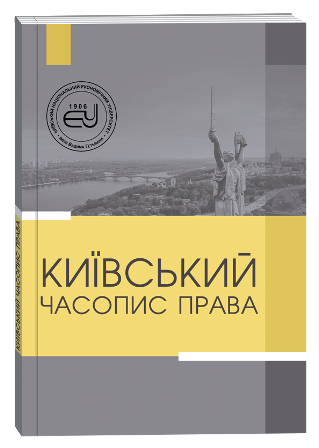COMPARATIVE LEGAL ANALYSIS OF CRIMINAL LIABILITY OF MILITARY PERSONNEL FOR OFFENSES INVOLVING MILITARY PROPERTY: NATO COUNTRIES’ EXPERIENCE AND PROSPECTS FOR UKRAINE
DOI:
https://doi.org/10.32782/klj/2025.2.48Keywords:
special subject of offense, internal control, NATO standards, disciplinary liability, military justice, object of the crime, forms of guilt, aggravating circumstances, legal regime of property, abuse preventionAbstract
This article presents a comparative legal study of the regulation of criminal liability for offenses involving violations of the procedure for the use and storage of military property in the legislation of leading NATO countries. The paper thoroughly examines the regulatory approaches of the United States, the United Kingdom, France, and Canada concerning the legal status of military property, the elements of criminal offenses, the characteristics of the offender, and the conditions of criminal prosecution. Differences in the structure of legal norms establishing criminal liability for unlawful handling of property in the armed forces are analyzed, with a focus on the distinction between negligence and intent, as well as the specifics of determining aggravating circumstances. The author outlines the forms of guilt, typical components of the actus reus, and approaches to the legal qualification of acts depending on their consequences and circumstances.Special attention is paid to the distinction between criminal and disciplinary liability, which in NATO member states is supported by well-defined procedural grounds and ensures an effective response without violating the principle of proportionality. The article addresses the structure of military jurisdiction, including the functioning of specialized courts, internal investigative bodies, and control mechanisms. It is shown that military justice models in the USA, the UK, France, and Canada aim to balance judicial independence with internal accountability within the armed forces. Based on the analysis, conclusions are drawn about the applicability of selected foreign practices to Ukraine. Under martial law and increased use of logistical resources, the formation of an effective system for preventing military-related offenses becomes particularly relevant. This includes internal audits, institutional oversight, clear legal definitions of property, and well-structured procedural responses.The findings of the article may serve as a foundation for improving Ukraine’s criminal legislation regarding the legal regime of military property and ensuring national defense in alignment with Euro-Atlantic legal standards.
References
Діденко Н. В. Кримінальна відповідальність за посягання на військове майно в системі права США : автореф. дис. … канд. юрид. наук : 12.00.08. Харків, 2017. 21 с.
Мірошниченко Г. І. Військове право держав-членів НАТО : навч. посіб. Київ : Ліра-К, 2021. 212 с.
Радзієвський В. О. Порівняльний аналіз правового забезпечення військової юстиції Великобританії та України : монографія. Київ : Національна академія внутрішніх справ, 2020. 168 с.
Прокопчук С. М. Кримінальна відповідальність військовослужбовців у праві Канади: порівняльно-правовий аспект : автореф. дис. … канд. юрид. наук : 12.00.08. Львів, 2016. 19 с.
Саприкін С. В. Система логістичного контролю в армії США: організаційно-правові засади : монографія. Київ : Національний університет оборони України, 2021. 256 с.
Сидоренко А. Ф. Внутрішній аудит як механізм запобігання правопорушенням у військових формуваннях Великої Британії : автореф. дис. … канд. юрид. наук : 12.00.07. Київ, 2020. 21 с.
Шатун Н. С. Військова юстиція Франції: організаційно-правовий вимір : автореф. дис. … канд. юрид. наук : 12.00.09. Харків, 2021. 19 с.
Гудима О. І. Дисциплінарна та кримінальна відповідальність військовослужбовців у Канаді: структура, функції, регламентація : автореф. дис. … канд. юрид. наук : 12.00.07. Львів, 2022. 23 с.
United States Code, Title 10 – Armed Forces. 2022. URL: https://uscode.house.gov
Armed Forces Act 2006. United Kingdom. URL: https://www.legislation.gov.uk/ukpga/2006/52/contents
National Defence Act, R.S.C. 1985, c. N-5. Canada. URL: https://laws-lois.justice.gc.ca/eng/acts/N-5/
Chapman D. A. Military Justice in the United States: Structure and Oversight // Military Law Review. 2019. Vol. 228. P. 45–76.
Moreau L. Le contrôle administratif dans les forces armées françaises // Revue du droit militaire. 2020. № 1. P. 17–33.
Brown T. Civil-Military Justice Integration in Canada: Balancing Security and Rights // Canadian Journal of Military and Strategic Studies. 2018. Vol. 14(2). P. 101–118.








